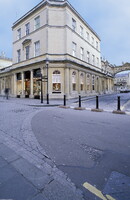| dc.coverage.spatial | Site: Bath, England, United Kingdom | en_US |
| dc.coverage.temporal | 1791-1792 (creation) | en_US |
| dc.creator | Baldwin, Thomas | en_US |
| dc.date | 1791-1792 | en_US |
| dc.date.accessioned | 2013-03-14T19:50:09Z | |
| dc.date.available | 2013-03-14T19:50:09Z | |
| dc.date.issued | 1791-1792 | en_US |
| dc.identifier | 199984 | en_US |
| dc.identifier.other | archrefid: 1195 | en_US |
| dc.identifier.uri | http://hdl.handle.net/1721.3/107746 | |
| dc.description | The southwest corner; However, the architect who carried Bath from austere Palladianism into the more delicate Neo-classical style associated with Robert Adam was Thomas Baldwin (1750-1820). Baldwin became city surveyor in 1776. In addition, Baldwin brought the light elegance of his oval paterae, ribboned festoons and sharply moulded entablatures into the centre of the city with Bath Street (1791). This was a segmental-ended thoroughfare of shops and houses set back behind Ionic colonnaded pavements that linked his Cross Bath (ca. 1786)--a small pump room replacing the medieval structure visited by Queen Mary in the 1680s--to his impressive Great Pump Room (1791-1792). Source: Grove Art Online; http://www.groveart.com/ (accessed 1/25/2008) | en_US |
| dc.format.medium | Bath stone | en_US |
| dc.rights | © Scott Gilchrist, Archivision, Inc. | en_US |
| dc.subject | architectural exteriors | en_US |
| dc.subject | scientific or medical | en_US |
| dc.subject | Roman Empire | en_US |
| dc.subject | Neoclassical | en_US |
| dc.title | Bath Street and Great Pump Room | en_US |
| dc.type | image | en_US |
| dc.rights.access | Licensed for educational and research use by the MIT community only | en_US |
| dc.identifier.vendorcode | 1A1-WJ-RB-A4 | en_US |
| vra.culturalContext | British | en_US |
| vra.technique | construction (assembling) | en_US |
| vra.worktype | street | en_US |
| vra.worktype | society building | en_US |
| vra.worktype | spa | en_US |
| dc.contributor.display | Thomas Baldwin (British architect, 1750-1820) | en_US |


